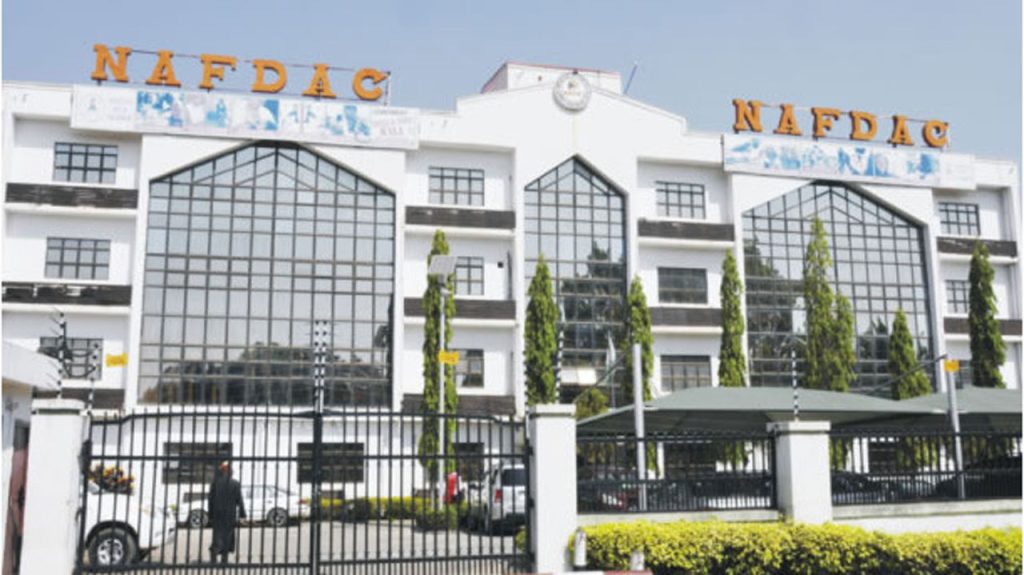The National Agency for Food and Drug Administration and Control (NAFDAC) has raised serious concerns about the activities in Eziukwu Market, popularly referred to as Cemetery Market, located in Aba, Abia State. The agency has identified the market as a major hub for the production and distribution of counterfeit and substandard products, posing a significant threat to public health and safety.

NAFDAC’s Recent Operation
This alarming revelation follows a high-profile operation spearheaded by NAFDAC’s South-East Zonal Director, Mr. Martins Iluyomade, on Tuesday. The operation unveiled widespread illegal activities, underscoring the market’s reputation as a hotbed for the proliferation of fake goods.
Mr. Iluyomade painted a grim picture of the situation, likening the production and distribution of these counterfeit goods to “weapons of mass destruction.” He highlighted the grave dangers posed to consumers who unknowingly purchase and use these products, jeopardizing their health and safety.
Persistent Illegal Activities
Despite multiple enforcement efforts, including a major crackdown in December 2023, the illegal trade in fake and substandard products has continued unabated in the market. This persistence, according to Iluyomade, reflects the unwavering determination of some individuals to profit at the expense of the lives of fellow citizens.
Get TikTok SEO Cheat here
“It is baffling that people remain recalcitrant and determined to make money at the expense of the lives of their fellow citizens,” he stated during the operation.
Market Leaders Under Scrutiny
NAFDAC’s frustration with the situation is further compounded by what it perceives as a lack of accountability on the part of the market’s leadership. During the December 2023 operation, the market leaders signed an agreement with NAFDAC to identify and expose individuals involved in the production and sale of fake goods. However, with the illegal activities persisting, the market leaders now face tough questions from the agency.
“During the last operation, the leadership of the market signed an undertaking with NAFDAC to identify and expose those involved in the production and sale of fake goods,” Iluyomade reiterated. “They now have serious questions to answer.”
Troubling Discoveries
One of the most disturbing findings during the operation was the discovery of expired products being re-validated. Mr. Iluyomade described this practice as deeply troubling and emphasized the critical need for consumers to remain vigilant when purchasing products.
Among the counterfeit and adulterated goods uncovered during the raid were a wide range of consumables, including wines, whiskey, yogurt, carbonated drinks, chips, dry gin, and other beverages. These items were often produced in highly unsanitary conditions or stored in areas where expired products were being relabeled with falsified expiration dates.
NAFDAC’s Commitment to Action
In response to these alarming findings, NAFDAC has reaffirmed its unwavering commitment to cracking down on these illegal activities. The agency vowed to identify and prosecute individuals involved in the production and distribution of fake and substandard products, as part of its broader mandate to safeguard public health.
“In regards to the findings, NAFDAC has reaffirmed its commitment to identifying and prosecuting those responsible for the nefarious activities as part of its broader effort to safeguard public health,” Iluyomade concluded.
Related Incidents
The latest revelations come on the heels of other troubling cases handled by NAFDAC. Recently, the agency destroyed 828 cartons of Bioflex infusions supplied by Biomedical Company Limited, Ilorin, after the products failed sterility tests. This action followed a complaint from Ahmadu Bello University Teaching Hospital (ABUTH), Shika, regarding the presence of suspended particles in the infusions. Laboratory analysis confirmed the contamination, prompting NAFDAC to crush, bury, and burn the cartons to ensure complete and irreversible disposal.
Additionally, NAFDAC flagged the illegal sale of ZACEF-TZ Injection, an unregistered brand of Ceftriaxone Sodium Injection, in Abuja. Such incidents highlight the pervasive nature of counterfeit and substandard medical products in the country.
What Consumers Should Know
Consumers are urged to exercise extreme caution when purchasing products, particularly from markets known for counterfeit goods. By remaining vigilant, individuals can reduce their exposure to potentially harmful products and protect their health. NAFDAC continues to work tirelessly to combat these threats, but public awareness and cooperation are crucial in the fight against fake and substandard products.
Conclusion
The situation in Eziukwu Market underscores the urgent need for collective action to address the scourge of counterfeit and substandard goods. NAFDAC’s efforts, while commendable, require the support of market leaders, law enforcement agencies, and the general public to achieve lasting change. Protecting public health and safety must remain a priority, and those responsible for these illegal activities must be held accountable.
Read also:
- 7 Ways to Save Snapchat Content Without Being Detected
- Google November 2024 Core Update Rollout Completed
- Why Your Phone Is Overheating and How to Fix It
- How to Open a Domiciliary Account in Nigeria
- How to Deposit Money in Your Domiciliary Account in Nigeria
- Top 10 Online AI Watermark Removers to Use in 2024
- How to Block Unwanted Calls on iPhone and Android
- Minister Encourages NYSC Corps Members to Embrace Creativity and Innovation in Community Service
- NYSC Reveals Registration Date for 2024 Batch C Corps Members
- Best Way to Permanently Delete Your WordPress Website Through cPanel